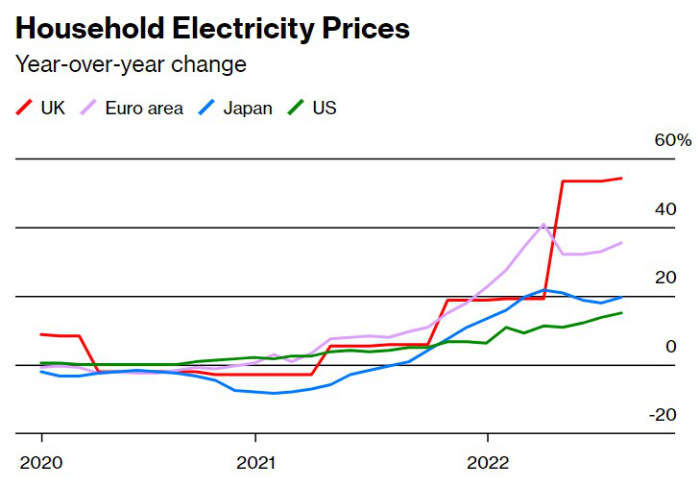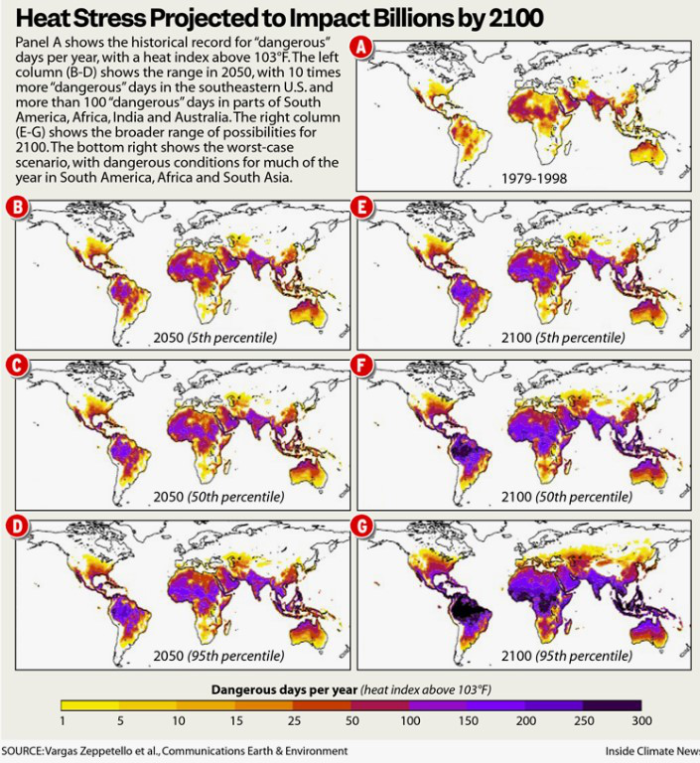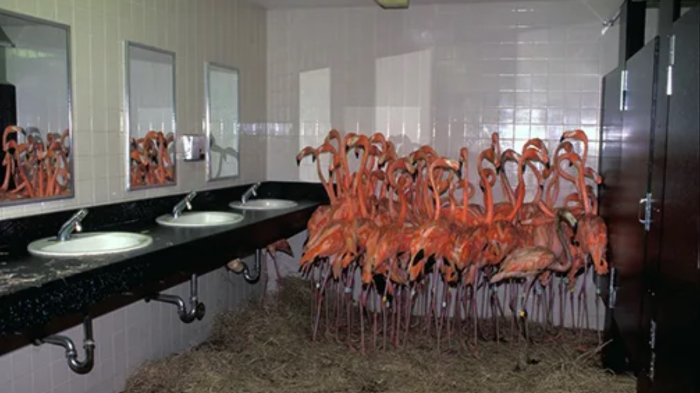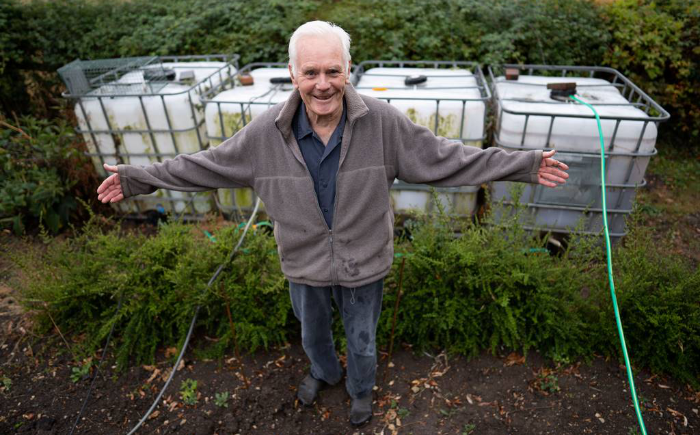In short:
- Global monkeypox cases declined by 21%—cases in the US still rising.
- Europe’s worst drought in 500 years will last until November.
- The tropics will have up to six months of dangerous heat a year by 2050.
Economy, food security, supply chain
The White House announced a student loan forgiveness plan; some worry it will fuel inflation. The administration is forgiving up to $10,000 in student loan debt for borrowers making less than $125,000 per year and $20,000 for Pell Grant recipients. Biden extended a payment freeze on federal student loans and interest accrual until Dec 31.
Here’s the WH factsheet and an explainer from Federal StudentAid.
Some extra reading: Student loan forgiveness – experts on banking, public spending and education policy look at the impact of Biden’s plan; Everything you need to know about Pell Grants; Will student loan forgiveness make inflation worse?; Big US banks like Goldman Sachs and Bank of America are pretty ‘meh’ on Biden’s student loan forgiveness; Student loan crisis awaits new generation despite Biden plan.
US baby formula waiver for WIC recipients is extended through Dec 31 or 60 days after the state’s emergency ends, whichever is first.
US food stamp spending went up 89% in the past two years because of the pandemic. According to the USDA, spending on food stamps over the past decade has increased by $53.5 billion, which is how much the program cost in 2009 during the Great Recession.
Pandemic-era unemployment programs expired in September. Here’s what to know about benefits if you need to file for them.
Scientists in India are exploring ways to adapt dairy production to climate change. Researchers at the National Dairy Research Institute are developing things like new breeds of buffalo and testing new crops of shrubs for protein content. India is the world’s largest milk producer, generating more than 200 million tons annually. The dairy industry relies on 80 million farmers across the country (most with small herds) and accounts for nearly 5% of India’s economy.
High gas prices are affecting fertilizer production in Europe:
We are gonna need a bigger map! Here's the latest map of fertilizer production cuts in Europe due to high natural gas prices courtesy of our data wizard @yashasmudumbai.#ICIS #fertilizer #energy #naturalgas #Europe #nitrogen #ammonia #NPK #phosphates pic.twitter.com/j8HXe4ZaPK
— Sylvia Tranganida (@ICIS_Sylvia) August 25, 2022
Study: A rapid reduction in fossil fuel use required to achieve net zero emissions by 2050 could create a shortfall of sulfuric acid by 2040. Sulfuric acid is used to make phosphorus fertilizer or to extract metals used in everything from solar panels to electric car batteries. The demand for sulfur could be reduced by recycling and using alternative industrial technologies that don’t rely on sulfuric acid intensively.
Energy
Twenty million US homes are behind on energy bills and could face shut-offs. Average electricity prices rose 15% in July, the biggest increase since 2006. The power bill crisis is worse in Europe, where natural gas prices have spiked since Russia invaded Ukraine.

Germany approves energy-saving measures for winter. Measures include limits on lighting and heating in public spaces and will roughly reduce gas usage by 2-2.5%. The legislation also approved the prioritization of energy transport on the nation’s railways.
Explainer: Why are UK energy bills rising?
Japan wants to restart its nuclear plants and consider opening new ones. The decision is based mainly on the energy crisis caused by Russia’s invasion of Ukraine, which has increased energy costs across the globe.
Study: Conflict in the South China Sea threatens 90% of Australia’s fuel imports.
Does turning the air conditioning off when you’re not home actually save energy? A group of engineers believes that letting your home heat up while you’re out at work and cooling it when you get home can use less energy than keeping it consistently cool–but it depends on how energy intensive it is to remove heat from your home. More about the study here.
Ford F-150 Lightning drivers who boost the power grid might get paid in North Carolina. About 100,000 owners of the Lightning could get a rebate to help stabilize the local power grid during peak times. An interesting example of how electric vehicles could come to prop up local power grids.
France is paying car drivers nearly €4,000 to switch to electric bikes.
Climate change, environment, extreme weather
Flash floods rushed through Mississippi, which received one foot of rain in a day:
Five million people are under flood watch as torrential rains move across the Gulf Coast.
Flash floods devastated parts of Mississippi yesterday, causing train derailments, washing out roads, and forcing nursing home residents to flee to higher ground.@KerryNBC reports. pic.twitter.com/2SUk8PcFAc
— NBC Nightly News with Lester Holt (@NBCNightlyNews) August 26, 2022
Monsoon rains and floods have killed over 900 people in Pakistan this year.
Monsoon clouds are mesmerizing, though:
Stunning satellite imagery of monsoonal storms exploding across the American West ⚡️ pic.twitter.com/tBNykVND9U
— Colin McCarthy (@US_Stormwatch) August 25, 2022
The European Commission said that Europe is facing the worst drought in 500 years. 47% of Europe is under warning conditions, with an evident lack of soil moisture. Western Europe and the Mediterranean will likely experience warmer and drier conditions until November. 2022 yields for grain maize are set to be 16% below the average of the previous five years.
And the extreme heat experienced this year will be the norm by 2035:
NEW:
Latest @metoffice data shows the record-breaking heatwave experienced across Europe will be considered an 'average' summer by 2035.
It finds that, according to current predictions, an avg. summer in central Europe by 2100 will be +4°C hotter than the pre-industrial era. pic.twitter.com/QVoADNzykI
— Climate Crisis Advisory Group (@ClimateCrisisAG) August 25, 2022
The Mediterranean Sea is warming up so much that it is driving native species to the brink. There have been temperature increases ranging from 3 C (5.4 F) to 5 C (9 F) above normal. Water temperatures regularly exceeded 30 C (86 F) on some days.
China’s summer heat wave is also breaking all records.
Study: Deadly heat to surge by 2100, even with emissions reductions. By 2100 there are likely to be 15 days a year in which some countries near the equator experience heat indexes exceeding 124 F (51 C). Countries in the tropics and subtropics would likely experience as many as 180 days (6 months) of dangerous temperatures (a heat index above 103 F) by 2050. By 2100, those regions would likely experience a heat index at that level for most of the year.

Severe droughts have been bringing archaeological wonders and historic horrors to the surface all over the world. And now, even 113 million-year-old dinosaur tracks.
From the past: Hurricane Andrew
Remembering Hurricane Andrew, this day 30 years ago:
Andrew restrengthens over the Gulf of Mexico while moving west-northwestward away from Florida, reaching an intensity of 145 mph by early afternoon on August 25. The central pressure drops to 937 mb by the evening. #Andrew30 pic.twitter.com/rxAOE3pys8
— National Hurricane Center (@NWSNHC) August 25, 2022
‘Baptized by fire’: How Hurricane Andrew redefined the power of a monster hurricane.
NOAA: Hurricane Andrew at 30: Where science has taken us.
Thirty years after Hurricane Andrew devastated Florida, researchers are using a ‘Wall of Wind’ to design safer homes – but storms are getting even more intense.
Yes, photo shows flamingos in zoo bathroom during Hurricane Andrew. And here they are 😀

Health
Global monkeypox cases declined by 21%, led by a drop in infections across Europe. Over the past three weeks, sixteen countries have not reported new infections. The US currently has over 16,000 cases across all 50 states. Bavarian Nordic has expanded production in the US and is exploring the possibility of using technically expired doses to help bridge a growing supply-demand gap.
There was a steep rise in type 2 diabetes among children during the Covid pandemic. Children diagnosed with diabetes appear to get complications faster than adults. Here are the community’s tips on how to prep for rare/refrigerated medications.
Surgeries fail to return to pre-pandemic levels, resulting in severe backlogs and deferred surgeries that could have serious health care and cost implications for the future.
The rest
See below Dr. Chris Ellis‘ take on FEMA’s 2021 National Preparedness Report, which looks at the statistics and demographics of America’s preparedness—related: Five types of Resilient Citizens outlined by Cornell University and where to find them.
Just finished reading FEMA's 2021 National Preparedness Report. Some highlights:
1) They spill some admirable ink on trying to define what really is a "catastrophic" risk.
2) Depending on your politics, they've either a) gone woke or— Dr. Chris Ellis (@Prep4Disasters) August 20, 2022
Here’s a short article on Swedish preppers and one on Japanese preppers.
And a list of TP’s articles and guides relevant to this roundup:
- Why personal finance is critical for preppers and tips on money management, and relevant forum and blog posts.
- Food list: How to build your survival pantry with long-lasting food from the supermarket, and related.
- Off-grid power 101 and relevant forum and blog posts.
- Tips on how to survive extreme heat and related posts.
- Review of best portable space heater for the winter, and forum and blog posts about keeping warm.
- Best emergency water storage containers for your home, and best large water barrels and tanks.
Read about this lovely English gentleman who started storing rainwater after the drought of ’76 and is now prepared for the current water restrictions:


You are reporting the comment """ by on